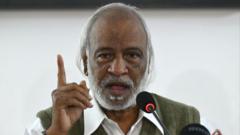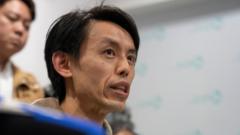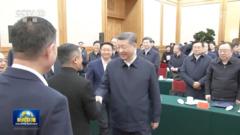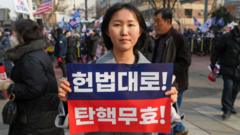As diplomatic relations between Bangladesh and India deteriorate, a diverse Bangladeshi delegation is engaging with China to strengthen ties. Political leaders, activists, and journalists are exploring the implications of increased Chinese influence in a context of historical pro-Indian sentiment under former leader Sheikh Hasina.
Bangladesh's Shifting Alliances: A Diplomatic Dance with China Amidst Indian Tensions

Bangladesh's Shifting Alliances: A Diplomatic Dance with China Amidst Indian Tensions
A 22-member Bangladeshi delegation is in China amid strained ties with India, exploring new diplomatic pathways.
In a significant development in South Asia's geopolitical landscape, a 22-member delegation from Bangladesh, comprising political leaders, civil society activists, academics, and journalists, has embarked on a ten-day visit to China. This trip aims to foster goodwill and discussions with Chinese government officials and members of the ruling Communist Party, amidst increasing tensions between Bangladesh and India.
Ousted Bangladeshi Prime Minister Sheikh Hasina has sought asylum in India, and Bangladesh's request for her extradition has been denied, heightening diplomatic strains. Abdul Moyeen Khan, a senior official from the Bangladesh Nationalist Party (BNP) and leader of the delegation, emphasized that this visit reflects a unique outreach by Beijing—inviting a diverse representation from Bangladesh.
The delegation features individuals affiliated with the BNP, a party led by former Prime Minister Begum Khaleda Zia, and members from the student movement that orchestrated the uprising against Hasina last August. The interim government, currently helmed by Nobel laureate Muhammad Yunus, has been pressing India to extradite Hasina to address allegations against her, including crimes against humanity linked to government crackdowns that reportedly resulted in around 1,400 deaths.
Historically, Bangladesh and India enjoyed robust ties under Hasina's administration, characterized by strong pro-Indian sentiments. However, following her removal, China has aggressively sought to engage with Bangladeshi political actors, potentially seeing the political vacuum as an opportunity to expand its influence in the region.
The latest diplomatic engagement builds on prior discussions between Yunus's advisors and Chinese officials, indicating a strategic shift in Bangladesh's foreign relations. With China emerging as the primary trading partner—bilateral trade between the two nations reaches approximately $24 billion—Beijing's assistance extends to a crucial military supply line as well.
In stark contrast, India's engagement with the Bangladeshi interim government has been limited, prompting protests from the BNP regarding perceived Indian interference, particularly the sheltering of Hasina. Indian Foreign Minister Subrahmanyam Jaishankar's comments highlighted the growing tensions, suggesting that Bangladesh must define its own diplomatic course.
Analysts speculate that ongoing discord between Dhaka and Delhi could drive Bangladesh further into China's orbit. This shift may mirror similar dynamics seen in Sri Lanka, the Maldives, and Nepal, where both India and China vie for influence in a region increasingly marked by competing interests. Reflecting on these developments, some experts warn against India's perception of South Asia as exclusively within its sphere of influence, contending this could lead to isolation and diplomatic setbacks.



















